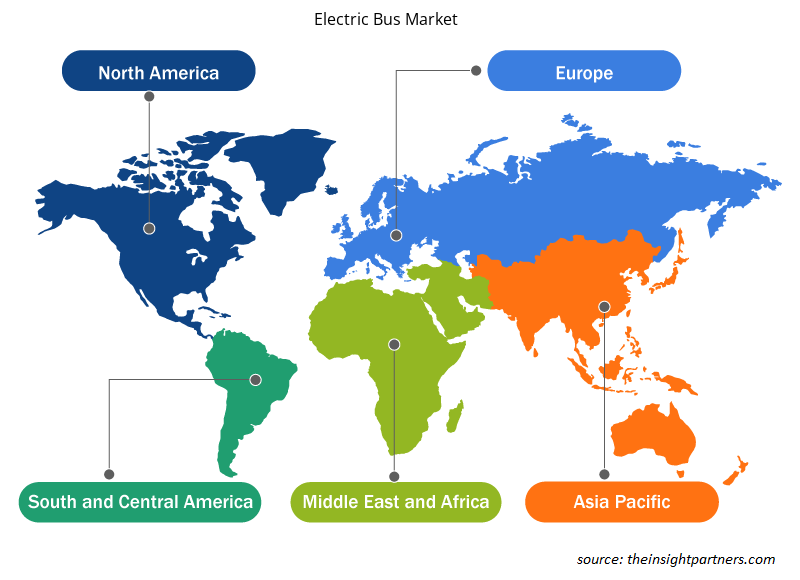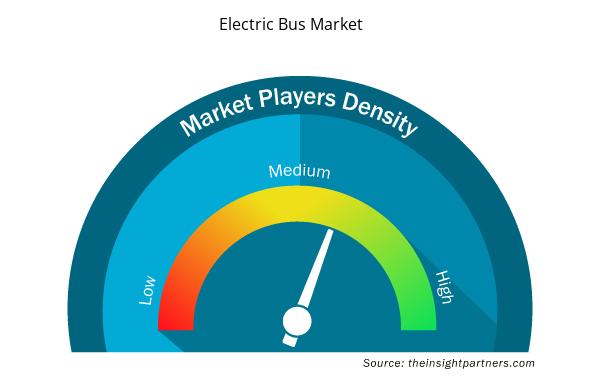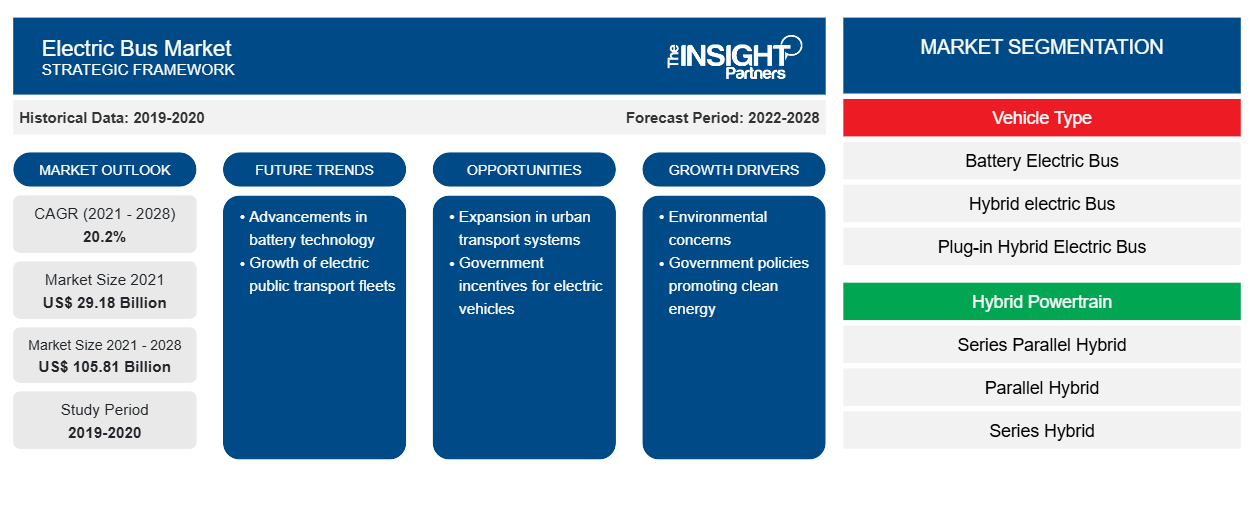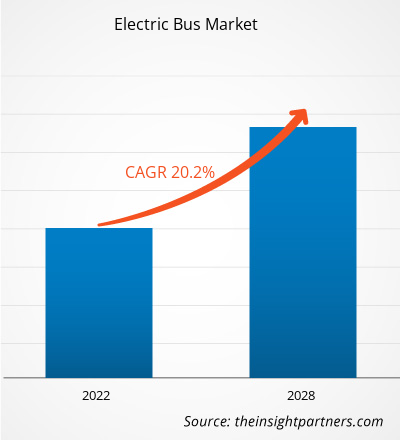[研究报告] 2021年电动公交车市场价值为 291.7951 亿美元,预计到 2028 年将达到 1058.0815 亿美元;预计 2021-2028 年复合年增长率为 20.2%。
分析师观点:
近年来,电动公交车市场经历了显著的增长和转型。随着人们对环境可持续性的日益关注和减少碳排放的需求,电动公交车已成为公共交通的一个有前途的解决方案。电动公交车由电力而非传统化石燃料驱动,具有零尾气排放、减少噪音污染和提高能源效率等诸多优势。这些因素推动了全球电动公交车的普及。许多国家的政府和交通机构一直在积极推动电动公交车的部署,作为其可持续交通计划的一部分。他们实施了各种激励措施、补贴和法规,以鼓励电动公交车的普及,并加速向绿色公共交通的过渡。电动公交车领域的主要市场参与者一直在大力投资研发,以增强电池技术、改善充电基础设施,并增加电动公交车的续航里程和效率。因此,电动公交车的性能和可靠性随着时间的推移得到了显着提高,使其成为传统公交车的可行替代品。
中国已成为最大的电动公交车市场,占全球销量的很大份额。中国政府的大力支持和优惠政策,以及该国减少污染的雄心勃勃的目标,推动了中国电动公交车市场的快速增长。然而,电动公交车并不仅限于中国。包括美国、欧洲国家和印度在内的其他几个国家也见证了电动公交车的采用激增。在欧洲,荷兰、德国和英国等国家在严格的排放法规和可持续交通目标的推动下,一直处于电动公交车部署的前沿。电动公交车市场也在见证技术进步,例如自动驾驶电动公交车的发展。这些自动驾驶公交车有可能通过提供高效便捷的出行解决方案彻底改变公共交通。
市场概况:
完全电动且不使用传统内燃机 (ICE) 驱动的公交车称为电动公交车或电动巴士。一组电池或车载电池为车载电动机供电,从而驱动电动公交车。由于电动公交车不会排放任何污染物,而且比传统的汽油/柴油公交车更具成本效益,因此被认为是环保的。
定制此报告以满足您的需求
您可以免费定制任何报告,包括本报告的部分内容、国家级分析、Excel 数据包,以及为初创企业和大学提供优惠和折扣
- 获取此报告的关键市场趋势。这个免费样品将包括数据分析,从市场趋势到估计和预测。
市场驱动因素:
电动公交车在各城市和地区成功部署,推动电动公交车市场增长
电动公交车在各个城市和地区的成功部署对推动电动公交车市场的发展起着至关重要的作用。当城市和交通部门成功部署电动公交车队并展示其有效性时,就会产生积极影响,并以多种方式波及整个市场。首先,成功的部署可以作为概念验证,向其他城市和地区展示电动公交车的可行性和优势。当一个城市展示采用电动公交车的积极成果时,它会激励和鼓励其他城市效仿。交通部门和市政当局观察电动公交车的运行性能、环境影响和公众接受度,从而增强人们对其作为可持续交通解决方案的潜力的信心。
其次,成功的部署会产生多米诺骨牌效应,培养城市和地区之间的竞争意识。当邻近的城市或地区实施电动公交车并取得积极成果时,它会促使附近的管辖区考虑采用它们以保持竞争力。这创造了健康的市场竞争,随着越来越多的城市加入向更清洁、更环保的公共交通转型,推动了电动公交车市场的增长。此外,成功的部署也是一种学习机会。城市和交通机构可以借鉴早期采用者的经验,包括最佳实践、面临的挑战以及克服障碍的策略。这种知识共享使后续部署的实施更加顺畅和高效,从而加速电动公交车市场的整体增长。成功的部署还吸引了媒体的关注和公众的兴趣,为电动公交车带来了积极的宣传。媒体报道城市通过电动公交车实现环境里程碑和改善空气质量,提高了公众的认识。它支持公众将电动公交车视为传统公交车的可行和可持续替代品。这种知名度的提高有助于积极的市场情绪,鼓励更多的城市、交通机构和利益相关者接受电动公交车。这反过来又使得电动公交车更加实惠,对更广泛的城市和地区更具吸引力,从而推动市场增长。
节段分析:
根据车型,市场细分为纯电动公交车、混合动力公交车和插电式混合动力公交车。纯电动公交车细分市场在 2020 年占据了最大的市场份额,预计在预测期内将实现最高的市场复合年增长率。纯电动公交车已成为电动公交车市场的主导技术,占据了最大的市场份额。这主要是因为它们具有环境可持续性,因为它们不会产生任何尾气排放,符合全球减少碳排放的努力。电池技术的进步,包括提高能量密度和扩大续航里程,提高了纯电动公交车的性能和可行性。不断增长的充电基础设施网络进一步支持了它们的实用性。有利的政府政策和激励措施,加上主要公交车制造商的积极参与,促进了纯电动公交车的广泛应用。在这些因素推动市场增长的情况下,预计纯电动公交车将保持其在行业中的领先地位。
区域分析:
2021 年亚太地区电动公交车市场价值为 263.7534 亿美元,预计到 2028 年将达到 153.8611 亿美元;预计在预测期内复合年增长率为 20.2%。亚太地区已成为电动公交车的主导市场,增长显著,市场份额巨大。有几个关键因素促成了这一地区主导地位。首先,亚太地区,尤其是中国,一直处于电动公交车普及的前沿。中国实施了雄心勃勃的政策和目标,以解决空气污染问题并减少温室气体排放。
中国政府提供了强有力的支持和激励措施,包括补贴和补助,以加速电动公交车的部署。这种积极主动的做法推动中国成为全球最大的电动公交车市场,推动亚太地区占据整体主导地位。此外,亚太地区人口众多,城市中心众多,迫切需要可持续、高效的公共交通解决方案。快速的城市化和对空气污染和交通拥堵日益增长的担忧促使印度、日本和韩国等国的政府和交通部门优先采用电动公交车。密集的城市环境和繁忙的交通量使电动公交车成为减少排放和改善空气质量的有吸引力的选择。
此外,亚太地区强大的制造业生态系统在其占据主导地位方面发挥了重要作用。亚洲国家,尤其是中国,拥有强大的制造业基础设施和生产电动汽车(包括公交车)的专业知识。当地制造商在研发方面投入了大量资金,推动了电池技术和成本效益高的生产方法的进步。这导致了竞争激烈的市场格局和各种不同价位的电动公交车型号的出现,进一步助长了市场主导地位。此外,政府的支持性政策和举措加速了亚太地区电动公交车市场的发展。各国政府实施了法规、排放标准和财政激励措施,以鼓励采用电动公交车。这些政策创造了有利的商业环境,并为交通运输机构投资电动公交车队提供了动力。
关键球员分析:
电动公交车市场分析包括金龙联合汽车工业有限公司、沃尔沃集团、深圳五洲龙汽车有限公司、比亚迪股份有限公司、戴姆勒、亚历山大·丹尼斯有限公司、EBUSCO、Proterra Solaris Bus & Coach SA 和 NFI 集团公司等参与者。在电动公交车参与者中,沃尔沃集团和 EBUSCO 凭借其提供的多样化产品组合位居前两位。
电动公交车市场区域洞察
Insight Partners 的分析师已详尽解释了预测期内影响电动巴士市场的区域趋势和因素。本节还讨论了北美、欧洲、亚太地区、中东和非洲以及南美和中美洲的电动巴士市场细分和地理位置。

- 获取电动公交车市场的区域具体数据
电动公交车市场报告范围
| 报告属性 | 细节 |
|---|---|
| 2021 年市场规模 | 291.8亿美元 |
| 2028 年市场规模 | 1058.1亿美元 |
| 全球复合年增长率(2021 - 2028) | 20.2% |
| 史料 | 2019-2020 |
| 预测期 | 2022-2028 |
| 涵盖的领域 | 按车辆类型
|
| 覆盖地区和国家 | 北美
|
| 市场领导者和主要公司简介 |
|
电动公交车市场参与者密度:了解其对业务动态的影响
电动巴士市场正在快速增长,这得益于终端用户需求的不断增长,而这些需求又源于消费者偏好的不断变化、技术进步以及对产品优势的认识不断提高等因素。随着需求的增加,企业正在扩大其产品范围,进行创新以满足消费者的需求,并利用新兴趋势,从而进一步推动市场增长。
市场参与者密度是指在特定市场或行业内运营的企业或公司的分布情况。它表明在给定市场空间中,相对于其规模或总市场价值,有多少竞争对手(市场参与者)存在。
在电动公交车市场运营的主要公司有:
- 沃尔沃集团
- 金龙联合汽车工业有限公司
- 深圳市五洲龙电机有限公司
- 比亚迪股份有限公司
- 戴姆勒公司
免责声明:上面列出的公司没有按照任何特定顺序排列。

- 了解电动公交车市场顶级关键参与者概况
最新动态:
电动公交车市场中的公司大量采用并购等无机和有机战略。以下列出了一些近期的关键市场发展:
- 2022 年 3 月:Proterra Inc 宣布与 Shyft Group 达成一项战略性多年期供应协议,为其 Blue Arc 专用电动送货车和电动汽车底盘提供动力。
- 2020 年 7 月,沃尔沃集团与西澳大利亚公共交通管理局 (PTA) 达成合作,将沃尔沃首批电动巴士引入澳大利亚。当该技术在沃尔沃澳大利亚产品线中可用时,这些规定将替代能源汽车引入公共交通巴士网络。
- 历史分析(2 年)、基准年、预测(7 年)及复合年增长率
- PEST 和 SWOT 分析
- 市场规模价值/数量 - 全球、区域、国家
- 行业和竞争格局
- Excel 数据集



Report Coverage
Revenue forecast, Company Analysis, Industry landscape, Growth factors, and Trends

Segment Covered
This text is related
to segments covered.

Regional Scope
North America, Europe, Asia Pacific, Middle East & Africa, South & Central America

Country Scope
This text is related
to country scope.
常见问题
Asia Pacific dominated the electric bus market in 2020 with a share of 90.4% and is expected to continue its dominance by 2028. Europe is the second-largest contributor to the global electric bus market in 2020, followed by North America.
The major companies in electric bus market are AB Volvo; King Long United Automotive Industry Co., Ltd; Shenzhen Wuzhoulong Motors Co., Ltd; BYD Company Ltd; Daimler AG; Ebusco; CAF Group (Solaris Bus & Coach); Proterra Inc; NFI Group; and Van Hool NV.
Based on vehicle type, the global electric bus market is segmented into battery electric bus, hybrid electric bus, and plug-in hybrid electric bus. The electric bus market was dominated by the battery electric bus segment in 2020.
The major end user in electric bus market includes public, and private. In terms of market share, the market was dominated by the public segment in 2020.
An electric powertrain is combined with fuel cell systems, controlled technology, and batteries to power hydrogen fuel cell buses. These buses are considered next-generation green transportation because their lifespan is far longer than a typical electric bus. The hydrogen fuel cell bus can refuel quickly and has many routes. With such benefits, the demand for hydrogen fuel cell buses is skyrocketing. For instance, over a thousand hydrogen buses will be launched throughout Europe during the next few years. China has been at the forefront of this technology, moving the battery-electric-driven business forward. In the United States, the deployment of hydrogen-fueled buses has been slow, with hydrogen buses accounting for only 3.1% of total zero-emission buses (deployed or planned) across the country. The deployment will likely grow significantly over the next decade, with the scalability factor outweighing the high procurement costs. For instance, within the scope of three initiatives in Cwmbran, Warwickshire, and Ballymena, the UK Business Secretary announced a GBP 54 million fund to create the next generation of electric trucks and hydrogen-powered buses. The initiatives are expected to create around 10,000 employment and reduce 45 million tonnes of carbon emissions across the UK. Thus, increasing demand for hydrogen fuel bus will drive the electric bus market.
Electric buses employ a variety of batteries. Low-cost lithium ion-phosphate batteries are becoming increasingly used in electric buses. Batteries made of lithium-ion phosphate are both cost-effective and robust. The average price of these batteries is a significant benefit for automakers. Due to its speed, safety, and excellent thermal stability, lithium-ion phosphate batteries have seen a phenomenal increase in sales in recent years. To accommodate the growing need for longer driving ranges, market participants are implementing technical improvements to improve the operational efficiency of the batteries. This will increase electric bus sales. Electric bus manufacturers are always trying to improve efficiency and increase the range of their vehicles. Furthermore, the production of high-density Nickel, Manganese, and Cobalt (NMC) batteries are subject to significant intellectual property rights, primarily from Japanese and Korean battery manufacturers, and the use of LFP batteries avoids any risk of litigation while simultaneously promoting domestic battery suppliers over foreign competitors such as LG Chem and Samsung. For instance, CATL and BYD sold 78 percent of electric bus lithium-ion batteries in China in 2018, and both companies chose LFP batteries for electric buses. Thus, rising production of low-cost lithium ion-phosphate batteries will drive the demand for electric bus market.
Trends and growth analysis reports related to Automotive and Transportation : READ MORE..
The List of Companies - Electric Bus Market
- AB Volvo
- King Long United Automotive Industry Co., Ltd
- Shenzhen Wuzhoulong Motors Co., Ltd
- BYD Company Ltd
- Daimler AG
- Ebusco
- CAF Group (Solaris Bus & Coach)
- Proterra Inc
- NFI Group
- Van Hool NV
The Insight Partners performs research in 4 major stages: Data Collection & Secondary Research, Primary Research, Data Analysis and Data Triangulation & Final Review.
- Data Collection and Secondary Research:
As a market research and consulting firm operating from a decade, we have published and advised several client across the globe. First step for any study will start with an assessment of currently available data and insights from existing reports. Further, historical and current market information is collected from Investor Presentations, Annual Reports, SEC Filings, etc., and other information related to company’s performance and market positioning are gathered from Paid Databases (Factiva, Hoovers, and Reuters) and various other publications available in public domain.
Several associations trade associates, technical forums, institutes, societies and organization are accessed to gain technical as well as market related insights through their publications such as research papers, blogs and press releases related to the studies are referred to get cues about the market. Further, white papers, journals, magazines, and other news articles published in last 3 years are scrutinized and analyzed to understand the current market trends.
- Primary Research:
The primarily interview analysis comprise of data obtained from industry participants interview and answers to survey questions gathered by in-house primary team.
For primary research, interviews are conducted with industry experts/CEOs/Marketing Managers/VPs/Subject Matter Experts from both demand and supply side to get a 360-degree view of the market. The primary team conducts several interviews based on the complexity of the markets to understand the various market trends and dynamics which makes research more credible and precise.
A typical research interview fulfils the following functions:
- Provides first-hand information on the market size, market trends, growth trends, competitive landscape, and outlook
- Validates and strengthens in-house secondary research findings
- Develops the analysis team’s expertise and market understanding
Primary research involves email interactions and telephone interviews for each market, category, segment, and sub-segment across geographies. The participants who typically take part in such a process include, but are not limited to:
- Industry participants: VPs, business development managers, market intelligence managers and national sales managers
- Outside experts: Valuation experts, research analysts and key opinion leaders specializing in the electronics and semiconductor industry.
Below is the breakup of our primary respondents by company, designation, and region:

Once we receive the confirmation from primary research sources or primary respondents, we finalize the base year market estimation and forecast the data as per the macroeconomic and microeconomic factors assessed during data collection.
- Data Analysis:
Once data is validated through both secondary as well as primary respondents, we finalize the market estimations by hypothesis formulation and factor analysis at regional and country level.
- Macro-Economic Factor Analysis:
We analyse macroeconomic indicators such the gross domestic product (GDP), increase in the demand for goods and services across industries, technological advancement, regional economic growth, governmental policies, the influence of COVID-19, PEST analysis, and other aspects. This analysis aids in setting benchmarks for various nations/regions and approximating market splits. Additionally, the general trend of the aforementioned components aid in determining the market's development possibilities.
- Country Level Data:
Various factors that are especially aligned to the country are taken into account to determine the market size for a certain area and country, including the presence of vendors, such as headquarters and offices, the country's GDP, demand patterns, and industry growth. To comprehend the market dynamics for the nation, a number of growth variables, inhibitors, application areas, and current market trends are researched. The aforementioned elements aid in determining the country's overall market's growth potential.
- Company Profile:
The “Table of Contents” is formulated by listing and analyzing more than 25 - 30 companies operating in the market ecosystem across geographies. However, we profile only 10 companies as a standard practice in our syndicate reports. These 10 companies comprise leading, emerging, and regional players. Nonetheless, our analysis is not restricted to the 10 listed companies, we also analyze other companies present in the market to develop a holistic view and understand the prevailing trends. The “Company Profiles” section in the report covers key facts, business description, products & services, financial information, SWOT analysis, and key developments. The financial information presented is extracted from the annual reports and official documents of the publicly listed companies. Upon collecting the information for the sections of respective companies, we verify them via various primary sources and then compile the data in respective company profiles. The company level information helps us in deriving the base number as well as in forecasting the market size.
- Developing Base Number:
Aggregation of sales statistics (2020-2022) and macro-economic factor, and other secondary and primary research insights are utilized to arrive at base number and related market shares for 2022. The data gaps are identified in this step and relevant market data is analyzed, collected from paid primary interviews or databases. On finalizing the base year market size, forecasts are developed on the basis of macro-economic, industry and market growth factors and company level analysis.
- Data Triangulation and Final Review:
The market findings and base year market size calculations are validated from supply as well as demand side. Demand side validations are based on macro-economic factor analysis and benchmarks for respective regions and countries. In case of supply side validations, revenues of major companies are estimated (in case not available) based on industry benchmark, approximate number of employees, product portfolio, and primary interviews revenues are gathered. Further revenue from target product/service segment is assessed to avoid overshooting of market statistics. In case of heavy deviations between supply and demand side values, all thes steps are repeated to achieve synchronization.
We follow an iterative model, wherein we share our research findings with Subject Matter Experts (SME’s) and Key Opinion Leaders (KOLs) until consensus view of the market is not formulated – this model negates any drastic deviation in the opinions of experts. Only validated and universally acceptable research findings are quoted in our reports.
We have important check points that we use to validate our research findings – which we call – data triangulation, where we validate the information, we generate from secondary sources with primary interviews and then we re-validate with our internal data bases and Subject matter experts. This comprehensive model enables us to deliver high quality, reliable data in shortest possible time.


 获取此报告的免费样本
获取此报告的免费样本